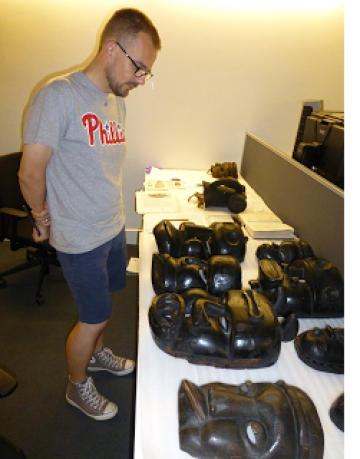Dr David Pratten

Associate Professor in the Social Anthropology of Africa
Fellow of St Antony's College
Bio
David Pratten joined the African Studies Centre in 2005-06. He is a social anthropologist and his post is a joint appointment with the Institute of Social Anthropology. He studied at Oxford, Manchester and SOAS, and previously taught at the universities of Edinburgh and Sussex. David was Head of the School of Anthropology and Museum Ethnography from 2021-2024.
Research Interests
David's research is based on a long-term engagement with Annang villagers in south-eastern Nigeria and focuses on themes of history, violence and the state. The focus of his initial work was an historical ethnography of colonialism which focused on the events surrounding a series of mysterious deaths in south-eastern Nigeria during the late 1940s. More recently his research has examined issues of youth, democracy and disorder in post-colonial Nigeria with a particular focus on vigilantism and new masquerade performances.
British Academy Summer Showcase 2018: Understanding the Niger Delta's agaba masquerade tradition
Contact
Email: david.pratten@anthro.ox.ac.uk
David is on Sabbatical leave for the 2024-2025 Academic Year.

David Pratten examining Nigerian Masks
(© Pitt Rivers Museum)
David is currently working on several research programmes including conducting research in Nigeria, under a French National Research Agency (ANR) project, called 'The politics of xenophobic exclusion in Africa: mobilisation, local orders and violence'. He is also a co-organiser of the African Print Culture Network which has organised workshops and panels at conferences over the past five years, culminating in the Cadbury Conference 2013 on African Newspaper Cultures held in Birmingham. The network has been supported by the John Fell Fund. His own research on this theme is a collaborative study with Professor Stephanie Newell (University of Sussex) into the life and works of J.V. Clinton; a provincial newspaper editor and writer.
David's publications include a monograph on the investigations into ritual murders in colonial Nigeria: The Man-Leopard Murders: History and Society in Colonial Nigeria published by Edinburgh University Press for the International African Institute, 2007. This book won the 2007 Amaury Talbot Prize awarded by the Royal Anthropological Institute.
He has also co-edited a volume of essays on vigilantism, Global Vigilantes: Perspectives on Justice and Violence published by Hurst & Co., 2007 along with two recent journal special issues. The first was on the influence of Michel de Certeau's theories on anthropologists published in Social Anthropology (Vol. 15.1 2007) and the other is on ‘Perspectives on Vigilantism in Nigeria’ in Africa (Vol. 78.1 2008).
David teaches on the MSc in African Studies and convenes the core course on research methodology along with an option course in the Culture and Society of West Africa which is available to students from a range of graduate programmes. He teaches and supervises MPhil and DPhil students in the Institute of Social and Cultural Anthropology and lecture on anthropological theory. He was awarded a Teaching Excellence Award in 2009.
He has previously been Director of the African Studies Centre (2009-2013) and was the Director of Graduate Studies.
Since 2010 David has been Co-Editor of AFRICA: Journal of the International African Institute which is the premier journal devoted to the study of African societies and culture.
Links
For more information please visit the African Studies Centre.
Learning from the Experts: Nigerian Masks and Masquerade(Pitt Rivers Museum blogpost featuring David Pratten, 6 September 2013).
I contributed to a programme about Masks on The Why Factor, broadcast on the BBC World Service in January 2014.
Books
2014, with Elizabeth Cooper, Ethnographies of Uncertainty in Africa, London: Palgrave Macmillan.
2007, Global Vigilantes: Perspectives on Justice and Violence, Hurst: London.
2007, The Man-Leopard Murders: History and Society in Colonial Nigeria, Edinburgh University Press & Indiana University Press for the International African Institute.
Book chapters
2012, ‘Retroversion, introversion, extraversion: three aspects of African anthropology’, In R. Fardon, O. Harris, Trevor H. J. Marchand, M. Nuttall, C. Shore, V. Strang, & Richard A. Wilson (eds) Sage Handbook of Social Anthropology, London: SAGE, pp. 308-324.
2010, ‘Bodies of power: narratives of selfhood and security in Nigeria’, In Thomas G. Kirsch and Tilo Grätz (eds) Domesticating Vigilantism in Africa, Oxford: James Curry, pp. 118-138.
2007, ‘The 'rugged life': Youth and violence in Southern Nigeria’, In P. Ahluwalia, L. Bethleham and R. Ginio (eds) Violence and Non-violence in Africa, Routledge: London, pp. 84-104.
2007, ‘Singing thieves: history and practice in Nigerian popular justice’, In D. Pratten and A. SenGlobal (eds) Vigilantes: Perspectives on Justice and Violence, Hurst: London, pp. 175-205.
2006, ‘The District Clerk and the ‘Man-Leopard Murders’: mediating law and authority in colonial Nigeria’, In Richard Roberts, B.N. Lawrance and E.L. Osborn (eds) Intermediaries, Interpreters and Clerks: African Employees and the Making of Colonial Africa, University of Wisconsin Press,pp. 220-247.
2005, ‘Conversion, Conquest and the Qua Iboe Mission’, In T. Falola (ed.) Christianity and Social Change in Africa: Essays in Honor of J.D.Y. Peel, Carolina Academic Press: Durham, North Carolina, pp. 413-40.
1995, with Suliman Ali Baldo, ‘Return to the Roots: Processes of Legitimacy in Sudanese Migrant Associations’, In Michael Edwards, David Hulme (eds) Non-Governmental Organisations - Performance and Accountability: Beyond the Magic Bullet, Earthscan: London, pp. 119-129.
Articles
2008, ‘Perspectives on Vigilantism in Nigeria’, Africa - Special Issue 78 (1).
2008, ‘Masking Youth: Transformation and Transgression in Annang Performance’, African Arts 41 (1), pp. 44-60.
2008, ‘The thief eats his shame: practice and power in Nigerian vigilantism’, Africa 78 (1).
2007, ‘Mystics and Missionaries: Narratives of the Spirit Movement in Eastern Nigeria’, Social Anthropology 15 (1), pp. 47-70.
2006, ‘The Politics of Vigilance in south-eastern Nigeria’, Development and Change 37 (1), pp. 707-734.
1997, ‘Local Institutional Development and Relief in Ethiopia: A Kire-based Seed Distribution Programme in North Wollo’, Disasters 21 (2), pp. 138-154.
1996, ‘Reconstructing Community: The Intermediary Role of Sahelian Associations in Processes of Migration and Rural Development’, African Rural and Urban Notes 3 (1), 1996, pp. 49-77.
Reports
2000, 'Return to the Roots? Urban Networks, Rural Development and Power in Sudan', University of Edinburgh: Edinburgh.
1997, 'Bamako Bound: The Social Organization of Migration in Mali', SOS Sahel International UK: London.


